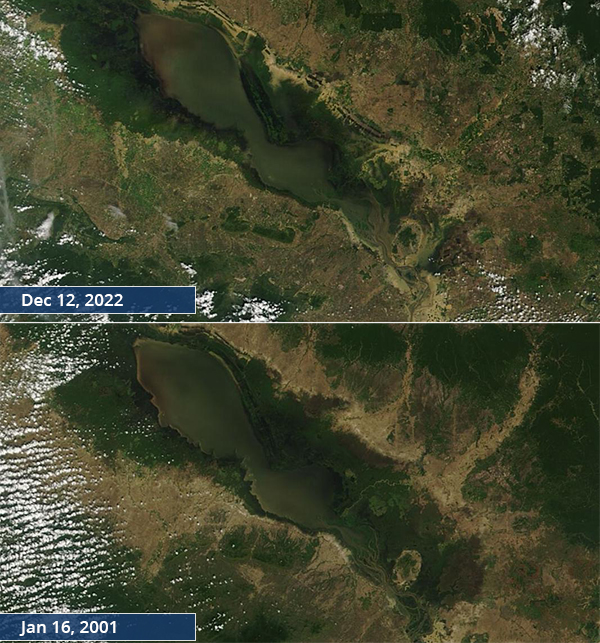Images
December 22, 2022 - The Weakening Pulse of Tonle Sap
Tweet
Cambodia’s Tonle Sap is a lake with a “pulse”, and in recent years that life-giving pulse has grown weaker.
During the dry season, the Tonle Sap River drains water from Tonle Sap Lake and carries it to the large Mekong River. In June, as monsoonal rains pour into the Mekong River, floodwaters push into the Tonle Sap River, causing the flow to reverse course and carry water into Tonle Sap Lake. This monsoonal influx can easily triple the size of the lake and raise its depth from roughly 2 meters (6.5 feet) to 10 meters (32 feet). When full, Tonle Sap Lake becomes Asia’s largest lake and freshwater fishery.
The importance of the seasonal pulse of Tonle Sap can’t be overstated. The flooding creates a massive lake and large, seasonal, freshwater wetlands that supports a superb fishery. The silt, nutrients, and moisture deposited during the monsoonal floods also renew farmland and forest. However, a series of dams along the Mekong—at least 11 were functioning in 2020 with up to 24 total planned—have severely slowed the seasonal inundation of Tonle Sap, with negative consequences on fishing, agriculture, the ecosystem, and the livelihoods of those who depend on the lake.
On December 12, 2022, the Moderate Resolution Imaging Spectroradiometer (MODIS) on board NASA’s Terra satellite acquired a true-color image of a nearly-full Tonle Sap (top image). The lower image is of the same area and was acquired on January 16, 2001, also by Terra’s MODIS. One of the most striking changes is the near-disappearance of the fresh-water streams and associated floodplains and deltas around Tonle Sap, especially on the northern shores of the lake. In 2001, these are seen as streaks of tan cutting through green vegetation and widening to v-shapes at the shoreline. In 2022, they are nearly absent.
Image Facts
Satellite:
Terra
Date Acquired: 12/12/2022
Resolutions:
1km (96.2 KB), 500m (239.3 KB), 250m (171.6 KB)
Bands Used: 1,4,3
Image Credit:
MODIS Land Rapid Response Team, NASA GSFC
Tweet
Cambodia’s Tonle Sap is a lake with a “pulse”, and in recent years that life-giving pulse has grown weaker.
During the dry season, the Tonle Sap River drains water from Tonle Sap Lake and carries it to the large Mekong River. In June, as monsoonal rains pour into the Mekong River, floodwaters push into the Tonle Sap River, causing the flow to reverse course and carry water into Tonle Sap Lake. This monsoonal influx can easily triple the size of the lake and raise its depth from roughly 2 meters (6.5 feet) to 10 meters (32 feet). When full, Tonle Sap Lake becomes Asia’s largest lake and freshwater fishery.
The importance of the seasonal pulse of Tonle Sap can’t be overstated. The flooding creates a massive lake and large, seasonal, freshwater wetlands that supports a superb fishery. The silt, nutrients, and moisture deposited during the monsoonal floods also renew farmland and forest. However, a series of dams along the Mekong—at least 11 were functioning in 2020 with up to 24 total planned—have severely slowed the seasonal inundation of Tonle Sap, with negative consequences on fishing, agriculture, the ecosystem, and the livelihoods of those who depend on the lake.
On December 12, 2022, the Moderate Resolution Imaging Spectroradiometer (MODIS) on board NASA’s Terra satellite acquired a true-color image of a nearly-full Tonle Sap (top image). The lower image is of the same area and was acquired on January 16, 2001, also by Terra’s MODIS. One of the most striking changes is the near-disappearance of the fresh-water streams and associated floodplains and deltas around Tonle Sap, especially on the northern shores of the lake. In 2001, these are seen as streaks of tan cutting through green vegetation and widening to v-shapes at the shoreline. In 2022, they are nearly absent.
Image Facts
Satellite:
Terra
Date Acquired: 12/12/2022
Resolutions:
1km (96.2 KB), 500m (239.3 KB), 250m (171.6 KB)
Bands Used: 1,4,3
Image Credit:
MODIS Land Rapid Response Team, NASA GSFC




